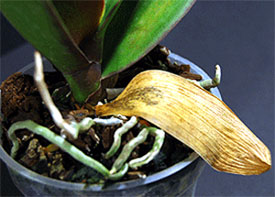
Here is some comfort for those who find they have accidentally killed their orchids from Larry Litwin, a veteran grower:
“I have been fortunate to have had the opportunity to grow orchids in climate-controlled growth chambers, greenhouses, outdoors, under lights and on windowsills. Throughout, I have managed to kill a lot of orchids. I feel qualified to offer reassurance to the beginner who has some apprehension. I would advise you not to worry.”
Of course, he understands, it will be by accident. “You will repot something at exactly the wrong time. You will both overwater and underwater. You will heavily fertilize a plant that is salt-intolerant. You will give shade lovers too much sun and sun lovers too much shade. This is unavoidable. Some mistakes will be made because you just didn't know any better. Others will occur because you followed well-intentioned advice which was inappropriate for your conditions.”
“Much of orchid growing depends on your experience. Experience takes time. The more experience you have, the more mistakes you will have made, the more problems you will be able to anticipate and avoid.”
“…reading and talking to other growers is very important. Learning what has worked for other people is only one of the benefits. This also exposes you to considerations which may not have occurred to you otherwise.”
His advice is to “balance all advice against your experience with your own conditions. Find out why the advice is given. Determine the cause-and-effect basis for the advice. Then analyze how that relates to your situation and conditions. Modify the advice as necessary and apply it. You won't go too far wrong. The important thing is to understand the "why" of it rather than the "how" or "what." Above all, be prepared to make mistakes.”
In closing, he offers, “don't fret too much over the ones you kill. It really can't be helped.”
Read the full article on the AOS website.

Copyright Just Add Ice® Orchids 2023